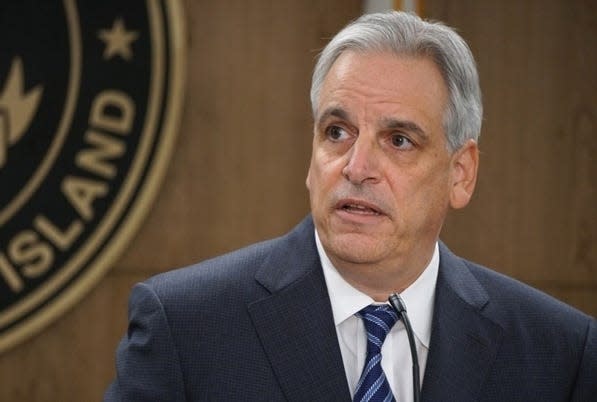National Grid sale: Court hears AG's appeal of RI's main electric and gas provider
PROVIDENCE — State utilities regulators failed to fully consider ratepayer impacts and the implications for climate action, among other issues, when they approved the $5.2-billion sale of Rhode Island’s primary energy provider.
So goes the argument made by the Office of Attorney General Peter Neronha, which appealed to Superior Court the February decision by the Division of Public Utilities and Carriers.
But PPL Corporation, the Pennsylvania company seeking to buy National Grid’s electric and natural gas operations in Rhode Island, counters that the division weighed all the relevant concerns and that Neronha’s office and its supporters are simply fighting the decision because they’re unhappy with the outcome.
'Clear error of law': RI AG challenges sale of Narragansett Electric Co. to PA company

On Tuesday, the two sides were in a Providence courtroom presenting their arguments on the adequacy of the division’s ruling on the proposed transaction, which is in limbo pending a decision by Judge Brian Stern.
While Stern wasn’t prepared to offer a decision immediately, he promised one soon. How he rules could determine the fate of the sale, or at least how quickly it proceeds. The parties to the deal secured approval from the Federal Energy Regulatory Commission without a hitch and cleared a necessary hurdle in Massachusetts after a settlement was reached with Attorney General Maura Healey last month. A resolution in Rhode Island is all that remains.
Lawyers with the attorney general’s office are not seeking to vacate the decision — which was made by the DPUC’s deputy administrator and signed off on by the administrator — and have the division restart the review process from square one. Rather, they want the court to remand the decision back to the division with instructions on issues that still need to be addressed.
If Stern returns the case to the division, it’s unlikely that it would lead to a different conclusion. But it could mean that PPL is required to offer more information on its plans for Rhode Island and, possibly, additional commitments.
That could be especially important in regard to the Act on Climate, a landmark measure that became state law last year and requires Rhode Island to slash planet-warming greenhouse gas emissions over the next three decades.
The law requires all state agencies to consider climate impacts, and while its passage was heralded as historic by its supporters, there is still some question about how it would be applied. But certain recent decisions, including the rejection of a fast-track approval for the expansion of a propane terminal in Providence, have lent weight to the law.
In the ruling on the propane terminal, the state Energy Facility Siting Board said that a detailed accounting of emissions impacts would be needed for an expansion of the Sea 3 Providence propane terminal to be considered.
The attorney General’s office wants a similar accounting done for the PPL transaction. Would the sale delay current programs that would affect emissions in the state? There needs to be more evidence showing the ramifications, said Sarah Rice, of the attorney general’s office.
In its decision, the utilities division said efforts around decarbonization are the responsibility of the Executive Climate Change Coordinating Council, the group of state agency directors and staff tasked with crafting Rhode Island’s climate change policies. Consideration of the law isn’t required by the statute governing the deal between PPL and National Grid, the division determined.
Rice disagreed.
“There is not time to wait for particular guidance from a board about what each agency must do,” she said.
Gerald Petros, a lawyer for PPL, said his client had made a commitment to continuing National Grid’s energy efficiency and renewable energy programs and will also come up with a decarbonization report within a year of the transaction closing.
Moreover, he said, there was ample evidence submitted during the division’s review showing that PPL’s smart grid platform for getting energy where it’s needed, which Petros described as nation-leading, would help integrate more renewables and that the company’s advanced meters would cut down on waste.
“We have the technology, we have the experience, that you need, that Rhode Island needs for its decarbonization efforts,” Petros said, paraphrasing testimony PPL CEO Vincent Sorgi gave to the division.
This article originally appeared on The Providence Journal: Court hears AG's appeal of RI's main electric and gas provider
